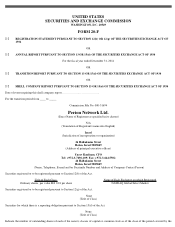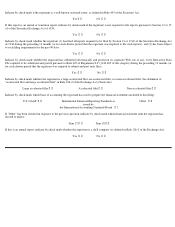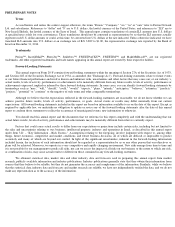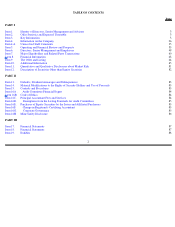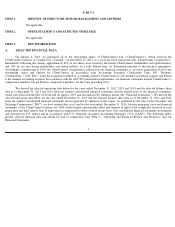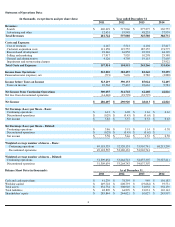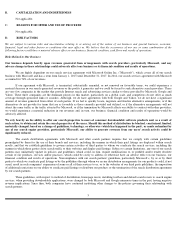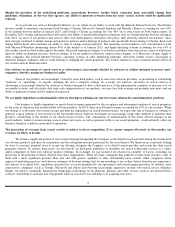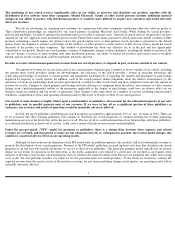Incredimail 2014 Annual Report Download - page 11
Download and view the complete annual report
Please find page 11 of the 2014 Incredimail annual report below. You can navigate through the pages in the report by either clicking on the pages listed below, or by using the keyword search tool below to find specific information within the annual report.
The marketing of our search services significantly relies on our ability to advertise and distribute our products together with the
distribution of free software from other companies. Should Microsoft, Google or other search partners institute additional material
changes in our ability to partner with distribution partners, it would be more difficult to acquire new customers and would adversely
affect our revenues .
We rely on advertising for acquiring new customers in conjunction with other companies distributing other free software products.
These distribution partnerships are regulated by our search partners, including Microsoft and Google. While abiding by search providers’
policies and guidelines, we seek to optimize the installation process in order to increase users’
selection of search services. In particular, we have
adopted an "opt out" approach to the installation process in the United States and Canada, pursuant to which, when users install a toolbar or other
products containing a search engine, the option to have the search engine serve as their primary search provider is presented as the default
option. Users are required to unselect each feature of the toolbar’s or other product’
s search services if they do not wish to install the search
functions of the product on their computers. This method of distribution has been very effective for us in the past and has significantly
contributed to our growth. Should our search partners continue to implement changes to their guidelines, including the further restriction of the
"opt out" feature, or restrict us from working with other distribution partners, our ability to market our products and search services would be
limited, and our results of operations could be materially adversely affected.
In order to receive advertisement-generated revenues from our search partners, we depend, in part, on factors outside of our control.
The amount of revenue we receive from each of our search partners depends upon a number of factors outside of our control, including
the amount these search providers charge for advertisements, the efficiency of the search provider’
s system in attracting advertisers and
syndicating paid listings in response to search queries and parameters established by it regarding the number and placement of paid listings
displayed in response to search queries. In addition, each of the search partners makes judgments about the relative attractiveness (to the
advertiser) of clicks on paid listings from searches performed on a toolbar or other search assets and these judgments factor into the amount of
revenue we receive. Changes to search partners' paid listings network efficiency, its judgment about the relative attractiveness of clicks on paid
listings from a platform-
generated toolbar or the parameters applicable to the display of paid listings could have an adverse effect on our
business, financial condition and our results of operations. Such changes could come about for a number of reasons, including general market
conditions, competition or policy and operating decisions made by Microsoft or Google or other of our search partners.
Our search revenue business is highly reliant upon a small number of publishers, who account for the substantial majority of pay-
outs
to publishers and, in parallel generate most of our revenues. If we were to lose all or a significant portion of those publishers as
customers, our revenues and results of operations would be materially adversely affected.
In 2014, the top 10 publishers distributing our search properties accounted for approximately 47% of our
revenues in 2014. There can
be no assurance that these existing publishers will continue to distribute our search properties or continue utilizing the revenue generating
monetization services at the levels they did in the past or at all. The loss of all or a substantial portion of our relationships with these publishers,
or a substantial reduction in their level of activity, could cause a material decline in our revenues and profitability.
Under the pay-per-
install ("PPI") model for payments to publishers, there is a timing delay between when expenses and related
revenues are recorded, and if projected revenues are not estimated correctly or, subsequent to payment, the revenue model changes, this
could have a material adverse effect on our operating results.
Although we have reduced our utilization of the PPI model with our publisher partners, this model is still used substantially in order to
promote the distribution of our search properties. Pursuant to the PPI model, publishers are paid up-
front each time they distribute our search
properties to an end user who installs our product or service or those of our publishers. This particular payment model typically has an adverse
impact on our results of operations in the short-
term, as the traffic acquisition costs related to a given user are recorded as an expense when
incurred, at the time a user accepts our monetization services, whereas the related revenues from that user are generated only when, and as long
as (if at all), the user performs searches, for which we receive payments from our search providers. To the extent we incorrectly estimate the
expected revenue from the search activity of the end user over time, for any reason including changes in the market, our operating results will be
materially adversely affected.
7


